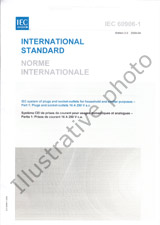We need your consent to use the individual data so that you can see information about your interests, among other things. Click "OK" to give your consent.

IEC 62319-1-ed.1.0
Polymeric thermistors - Directly heated positive step function temperature coefficient - Part 1: Generic specification
STANDARD published on 15.2.2005
The information about the standard:
Designation standards: IEC 62319-1-ed.1.0
Publication date standards: 15.2.2005
SKU: NS-414473
The number of pages: 33
Approximate weight : 99 g (0.22 lbs)
Country: International technical standard
Category: Technical standards IEC
The category - similar standards:
Annotation of standard text IEC 62319-1-ed.1.0 :
IEC 62319-1:2005(E) prescribes terms and methods of test for polymeric positive temperature coefficient thermistors, insulated and non-insulated types, typically intended for use in current limiting and overcurrent protection applications. It establishes standard terms, inspection procedures and methods of test for use in detail specifications for Qualification Approval and for Quality Assessment Systems for electronic components. The contents of the corrigendum of March 2009 have been included in this copy.
These corrections apply to this standard:
Corrigendum 1 - Polymeric thermistors - Directly heated positive step function temperature coefficient - Part 1: Generic specification
Correction published on 24.3.2009
Selected format:Show all technical information.
We recommend:
Technical standards updating
Do you want to make sure you use only the valid technical standards?
We can offer you a solution which will provide you a monthly overview concerning the updating of standards which you use.
Would you like to know more? Look at this page.



 Cookies
Cookies
